The downtown mansion at 342 Adelaide Street West, on the northwest corner of Adelaide and Peter Streets, looms over the street like a haunted house from a Hollywood thriller. Its tall tower, ornate cornice work and Mansard roof add to the impression that it was a place where evil lurked. Unfortunately there was no evil associated with the house, and the only mystery is establishing when the home was constructed.
342 Adelaide Street, at the corner of Peter Street.
View of the house looking west along Adelaide Street
City of Toronto Archives, Fonds 1244, Item 0601
The mansion, with its ornate turret is visible in the 1912 photo of Adelaide Street, looking east, when the building was a family residence. In the photo, it is behind the Alexander Engraving Company. The extension across the front of the house was added later in the year.
City of Toronto Archives, Fonds 1231 Item 108
This 1950 photograph shows the addition that was constructed across the front of the house in 1912.
City of Toronto Archives, Series 372, Sub-series 0068, Item 1962
Looking north on Peter Street toward Adelaide Street in July of 1962. The three-storey shops visible in the distance, on Queen Street, have been demolished and the site is now a parking lot.
The house on the northwest corner of Adelaide and Peter Streets as it appears today.
The Toronto list of heritage properties states that the house was built in 1858. Establishing the provenance of the the residence is not easy, as the houses on the street were renumbered three times. There are no Goad’s Atlas maps for the 1850s, and the building is not shown on the Bolton Map of 1858.
In the Toronto Directories, the first time that a house is listed on Adelaide Street near Peter is in 1861. It was 262 Adelaide Street, the residence of Frederick Perkins. I was unable to ascertain if this was in fact the house in question. The reason there is doubt is that between the years 1866 to 1868, the Directories state that the land on the north side of Adelaide between Peter Street and Spadina (Brant Street) contained only empty lots.
In 1869, the Directories again list the house at 262 Adelaide Street as the home of George Perkins. Apparently Frederick Perkins had relocated to a house at 26 College Street, and his brother George had moved into the property on Adelaide Street. George and Frederick Perkins were business partners. They owned “Perkins Ince. and Co.” – wholesale grocers and importer of wines and spirits. Their warehouse/shop was at 43 Front St. East.
In 1874, the address of the house was changed to number 298. However, the Goad’s Atlas shows that number 298 Adelaide was on the northeast corner of Adelaide and Peter Streets, not the northwest. The 1874 Toronto Directories do confirm that the house at 298 was that of George Perkins. This remains true during 1875 as well.
In 1876, Henry Seaton Strathy purchased the property at 298 Adelaide Street, and the Toronto Heritage list states that a Mansard roof was added in that year. Henry Strathy was born in Edinburgh in January of 1833. He first lived in Montreal, where he was a founding member of the Montreal Stock Exchange. In Toronto, he was head of the Federal Bank of Canada at 17 Wellington Street West. In 1876 he purchased the property at 298 Adelaide Street, to which he added the magnificent Mansard roof.
The Mansard roof of the house.
Facade and west side of the house
Brickwork under the cornice reveals where the Mansard roof was added in 1876.
Although the overall style of the house is Second Empire, it possesses an Italianate tower.
To view other posts about the history of Toronto and its buildings:
The 1860s houses on Elm St. (Barbarian’s Steak House)
The old “Silver Snail” shop on Queen St. West
The 1888 Toronto Club at Wellington and York
The north building at the St. Lawrence market that is to be demolished
The Ellis Building on Adelaide Street near Spadina Ave.
The Heintzman Building on Yonge Street, next to the Elgin Theatre
The tall narrow building at 242 Yonge Street, south of Dundas
https://tayloronhistory.com/2013/07/10/torontos-architectural-gems242-yonge-st-south-of-dundas/
Toronto’s first Reference Library at College and St. George Streets.
The Commodore Building at 315-317 Adelaide St. West
The Graphic Arts Building (condo) on Richmond Street
The Art Deco Victory Building on Richmond Street
The Concourse Building on Adelaide Street
The old Bank of Commerce at 197 Yonge Street
The Traders Bank on Yonge Street—the city’s second skyscraper
https://tayloronhistory.com/2013/05/22/torontos-architectural-gemstraders-bank-on-yonge-st/
Toronto’s old Union Station on Front Street, built in 1884
https://tayloronhistory.com/2013/05/18/torontos-lost-architectural-gemsthe-old-union-station/
St. Andrew’s Presbyterian Church at King and Simcoe Streets.
https://tayloronhistory.com/2013/05/13/torontos-architectural-gemshistoric-st-andrews-on-king-st/
The row houses on Glasgow Street, near Spadina and College Streets
https://tayloronhistory.com/2013/05/10/torontos-architectural-gemsrow-houses-on-glasgow-st/
The bank at Queen and Simcoe that resembles a Greek temple
The cenotaph at Toronto’s Old City Hall
https://tayloronhistory.com/2013/04/09/torontos-architectural-gemscenotaph-at-old-city-hall/
The magnificent Metropolitan Cathedral at King East and Church Streets
https://tayloronhistory.com/2013/04/02/torontos-architectural-gemsmetropolitan-cathedral/
St. Stanislaus Koska RC Church on Denison Avenue, north of Queen West
The historical St. Mary’s Church at Adelaide and Bathurst Streets
The Bishop’s (St, Michael’s) Palace on Church Street, Toronto
https://tayloronhistory.com/2013/03/02/torontos-architectural-gemsbishops-palace-on-church-street/
The Union Building at Simcoe and King Street West
https://tayloronhistory.com/2013/03/30/torontos-architectural-gemsthe-union-building-on-king-st/
The Ed Mirvish (Pantages, Imperial, Canon) Theatre, a true architectural gem on Toronto’s Yonge Street
The Waverly Hotel on Spadina near College Street.
https://tayloronhistory.com/2013/02/16/toronto-architectural-gemsthe-waverly-hotel-484-spadina/
The Art Deco Bank of Commerce building on King Street West.
The Postal Delivery Building, now the Air Canada Centre (ACC)
The Bellevue Fire Station on College Street
https://tayloronhistory.com/2013/02/14/torontos-architectural-gems-bellevue-fire-station/
The Bank of Nova Scotia at King and Bay Streets
Toronto’s old Sunnyside Beach
https://tayloronhistory.com/2013/02/01/a-pictorial-journey-to-sunnyside-beach-of-old-part-one/
https://tayloronhistory.com/2013/02/03/a-pictorial-journey-to-torontos-old-sunnyside-beach-part-two/
Toronto’s architectural gems—the Runnymede Library
https://tayloronhistory.com/2013/02/05/torontos-architectural-gems-runnymede-library/
Spadina Avenue – sinful, spicy and diverse
https://tayloronhistory.com/2012/09/28/sinfully-saucy-and-diversetorontos-spadina-avenue/
The Reading Building, a warehouse loft on Spadina Avenue
https://tayloronhistory.com/2013/01/20/torontos-architectural-gemsthe-reading-building-on-spadina/
The Darling Building on Spadina Avenue
https://tayloronhistory.com/2013/01/19/torontos-architectural-gemsthe-darling-building-on-spadina/
The amazing Fashion Building on Spadina Avenue
Toronto’s architectural gems – the Tower Building at Spadina and Adelaide Street
The Balfour Building at 119 Spadina Avenue
The Robertson Building at 215 Spadina that houses the Dark Horse Espresso Bar
An architectural gem – Grossman’s Tavern at Spadina and Cecil Streets
https://tayloronhistory.com/2012/11/08/architectural-gem-grossmans-tavern-at-377-9-spadina/Historic
History of the house that contains the Paul Magder Fur Shop at 202 Spadina
An important historic building that disappeared from the northeast corner of Spadina and College
Historic bank building on northeast corner of Spadina and Queen West
https://tayloronhistory.com/2012/12/02/torontos-architectural-gemsbank-at-spadina-and-queen-west/
History of the Backpackers’ Hotel at King and Spadina
https://tayloronhistory.com/2012/03/31/history-of-the-backpackers-hotel-at-king-and-spadina/
Hamburger corner – Spadina and Queen Streets
https://tayloronhistory.com/2012/10/10/torontos-hamburger-cornerwhere-is-it-and-why/
Lord Lansdowne Public School on Spadina Crescent
The Victory Burlesque Theatre at Dundas and Spadina
https://tayloronhistory.com/2012/09/08/the-sinful-victory-burlesque-theatre-at-dundas-and-spadina/
The Dragon City Mall on the southwest corner of Dundas and Spadina
https://tayloronhistory.com/2012/08/25/torontos-heritage-the-southwest-corner-of-queen-and-spadina/
Buildings on the west side of Spadina a short distance north of Queen Street.
History of the site of the Mcdonalds on northwest corner of Queen and Spadina
https://tayloronhistory.com/2012/08/27/mcdonalds-at-queen-and-spadina-on-an-historic-site/
A former mansion at 235 Spadina that is now almost hidden from view.
ttps://tayloronhistory.wordpress.com/2012/07/04/torontos-architectural-gems-is-this-one-a-joke/
Military hero of the War of 1812 lived near corner of Spadina and Queen West.
The Art Deco bus terminal at Bay and Dundas Streets.
Photos of the surroundings of the CN Tower and and the St. Lawrence Market in 1977
The old Dominion Bank Building at King and Yonge Street
The Canada Life Building on University and Queen Street West.
Campbell House at the corner of Queen Street West and University Avenue
A study of Osgoode Hall
https://tayloronhistory.com/2012/04/12/enjoying-torontos-architectural-gems-osgoode-hall/
Toronto’s first City Hall, now a part of the St. Lawrence Market
Toronto’s Draper Street, a time-tunnel into the 19th century
The Black Bull Tavern at Queen and Soho Streets, established in 1822
History of the 1867 fence around Osgoode Hall on Queen Street West at York Street
Gathering around the radio as a child in the 1940s
The opening of the University Theatre on Bloor Street, west of Bay St.
https://tayloronhistory.com/2012/02/24/the-opening-of-torontos-university-theatre-on-bloor-street/
122 persons perish in the Noronic Disaster on Toronto’s waterfront in 1949
Historic Victoria Memorial Square where Toronto’s first cemetery was located, now hidden amid the Entertainment District
https://tayloronhistory.com/2012/01/09/victoria-square-in-torontos-entertainment-district-is-a-gem/
Visiting one of Toronto’s best preserved 19th-century streets-Willcocks Avenue
The 1930s Water Maintenance Building on Brant Street, north of St. Andrew’s Park
Toronto’s architectural gems-photos of the Old City from a book published by the city in 1912
Toronto’s architectural gems in 1912
https://tayloronhistory.com/2012/12/04/torontos-architectural-gems-in-1912/
Toronto’s architectural gems – the bank on the northeast corner of Queen West and Spadina
https://tayloronhistory.com/2012/12/02/torontos-architectural-gemsbank-at-spadina-and-queen-west/
Photos of the surroundings of the CN Tower and and the St. Lawrence Market in 1977
The St. Lawrence Hall on King Street
https://tayloronhistory.com/2012/04/28/enjoying-torontos-architectural-gems-the-st-lawrence-hall/
Toronto’s streetcars through the past decades
https://tayloronhistory.com/2012/03/26/memories-of-torontos-streetcars-of-yesteryear/
History of Trinity Bellwoods Park
https://tayloronhistory.com/2012/04/09/the-history-and-beauty-of-trinity-bellwood-park/
A history of Toronto’s famous ferry boats to the Toronto Islands
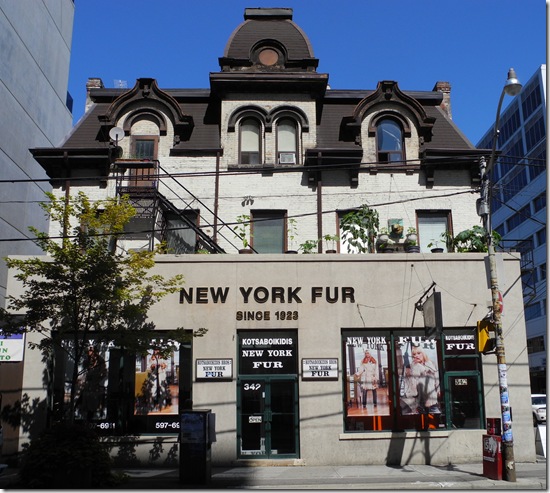
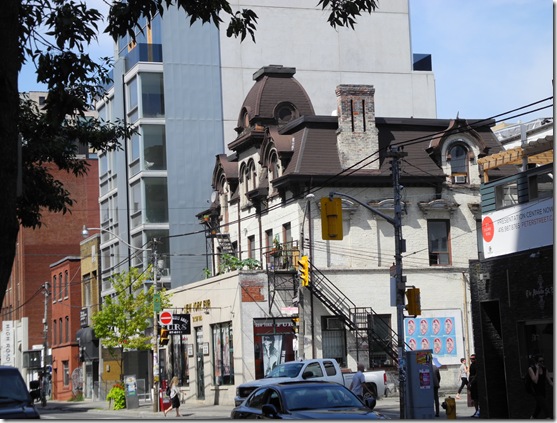
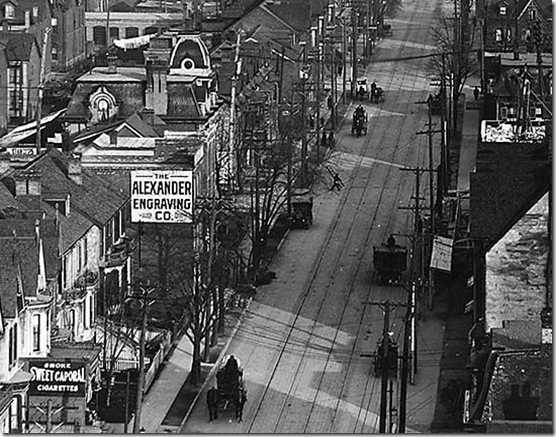
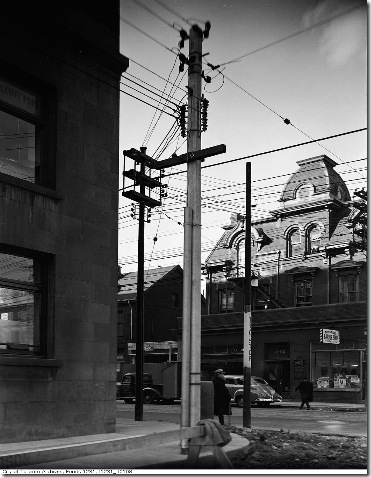
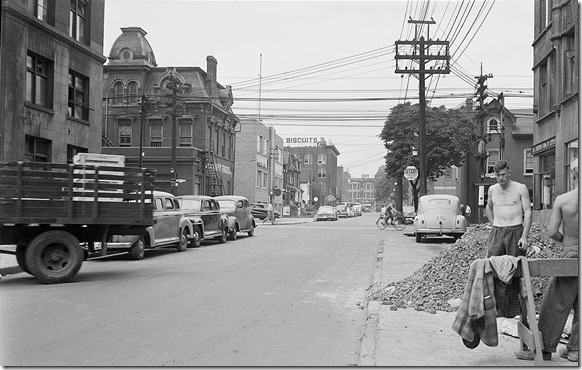
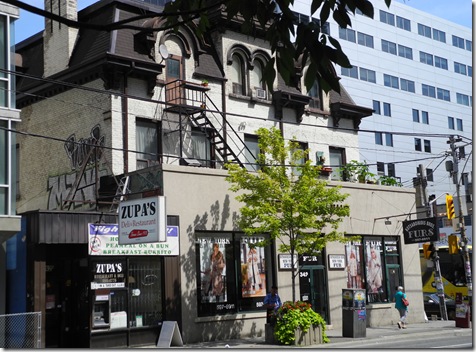
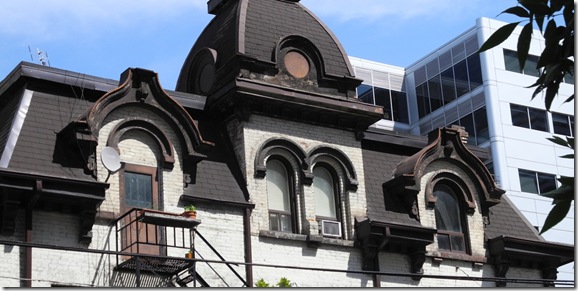
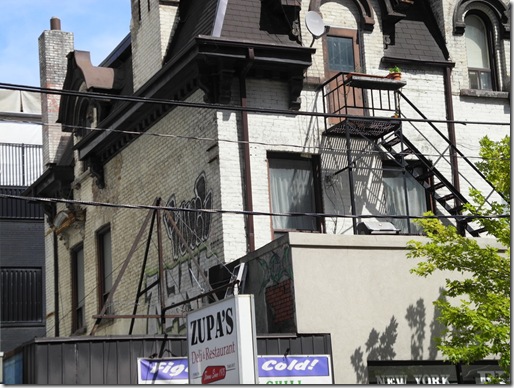
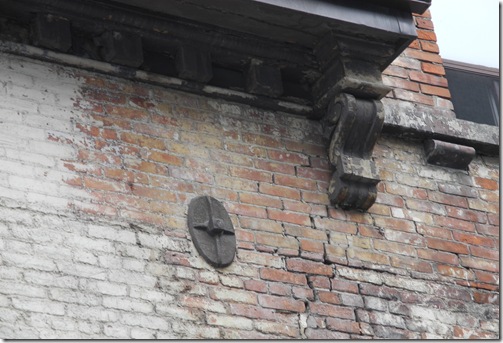
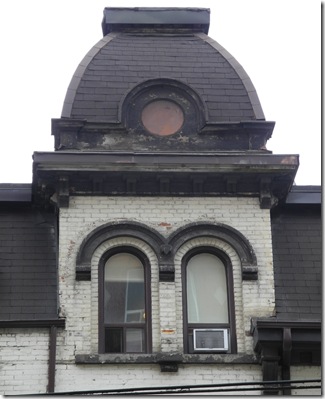
Thanks Doug, great article, I’ve always wondered about this house!
Many thanks for the comment. I am pleased that you enjoyed the post, and that you have anv interest in the historic houses of the area.
The northwest corner of Adelaide & Peter Streets was at one time the property of John Ross, the pioneer undertaker of Old Muddy York. It was Mr. Ross who was entrusted with the burial of General Sir. Isaac Brock in October of 1812. Ross moved his undertaking shop to Adelaide & Peter Sts. in 1825. Adelaide Street at that time was known as Hospital Street. I derive this information from Rev. Henry Scadding’s “Toronto of Old,” and from John Ross Robertson’s “Landmarks of Toronto” Vol. #3. Best Wishes, Victor C. Ernst.
Hi Victor,
Many thanks for the information that you sent. I sometimes find it difficult to pin-point Scaddings exact locations, but your comment was very helpful
Doug Taylor